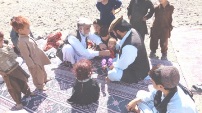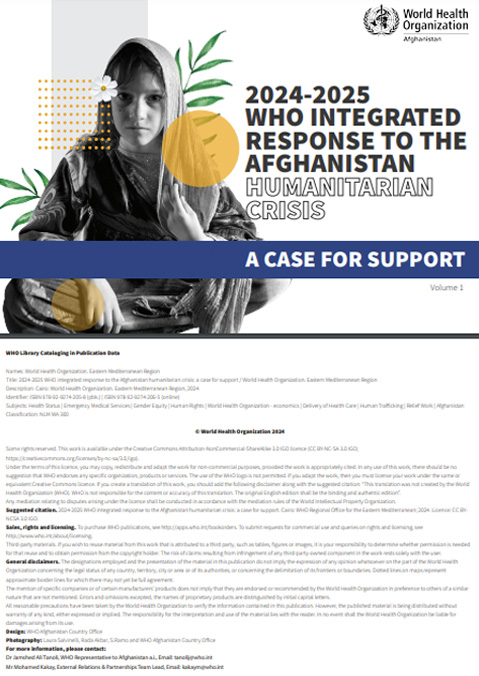 A refugee child from Pakistan's North Waziristan gets a medical check-up in Khost province in October 2014Pneumonia and acute respiratory infections present major concerns for the upcoming winter season in Afghanistan as many provinces face extreme cold weather conditions. So far 98 districts have been identified as being at high risk to suffer from extreme cold weather. To reduce morbidity and mortality due to freezing temperatures, WHO and partners have provided supplies to cover 400 000 people in these areas. Due to harsh winter weather conditions, many people will face difficulties in accessing health facilities. Temporary and static clinics will be established to ensure continued access.
A refugee child from Pakistan's North Waziristan gets a medical check-up in Khost province in October 2014Pneumonia and acute respiratory infections present major concerns for the upcoming winter season in Afghanistan as many provinces face extreme cold weather conditions. So far 98 districts have been identified as being at high risk to suffer from extreme cold weather. To reduce morbidity and mortality due to freezing temperatures, WHO and partners have provided supplies to cover 400 000 people in these areas. Due to harsh winter weather conditions, many people will face difficulties in accessing health facilities. Temporary and static clinics will be established to ensure continued access.
WHO emphasizes that multisectoral preparedness and response for the upcoming winter season is crucial for reducing morbidity due to natural disasters and extreme weather conditions. Awareness needs to also be raised on the specific health and hygiene risks people can face in the upcoming winter season. For instance, many people feel discomfort when washing hands or bathing in cold water and might be discouraged to adhere to basic hygiene practices.
The emergency and humanitarian action programme, together with WHO’s communicable disease surveillance and response programme is establishing an Ebola isolation unit in Kabul as a preparedness plan. The emergency water and sanitation team is providing support for infection control and prevention by installing a wastewater disposal system and a safe health care waste management system to avoid the spread of the virus to the environment in the event of hospitalization of an Ebola patient in the isolation unit. The preparedness plan will be finalized during November.
During October WHO also supported a number of trainings targeted at nongovernmental organizations and ministry staff as well as health care providers, including training workshops in basic trauma management and triage, emergency preparedness and response and the process of carrying out rapid assessments in emergency settings.












